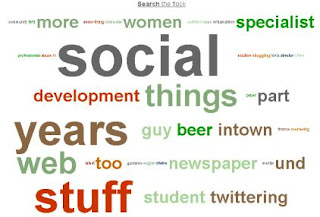Since its
creation, the Internet has evolved from a nuclear resistant military communications
network, via an academic knowledge-base, into a fully functional platform for
global information, communications and commerce.
I
recently met author James Glieck who said in his latest book The Information, “As the printing press,
the telegraph, the typewriter, the telephone, the radio, the computer and the
Internet prospered, each in its turn, people said, as if for the first time, that
a burden had been placed upon human communication: new complexity, new
detachment and a frightening excess.”
These
advances have had a profound and disruptive effect on markets and marketing,
and radically altered the way media is consumed, commerce is transacted and
communications are facilitated.
I
often characterise this as moving from ‘one market of a million’ to a ‘million
markets of one’. This inversion permits different ways and new opportunities to
engage with our customers, as individuals. It has changed how we might now undertake
market research, new product development, channel selection, customer
relationship management, advertising and marketing communications.
As
all these processes undoubtedly contribute to successful marketing, how much
more effective will we be when we increase two-way customer engagement and
focus? Digital marketing helps us to do
this.
If
marketing is about ‘anticipating, identifying and satisfying customer wants and
needs’, and creating products and services that ‘add value to, and are valued
by customers’, we now have a far broader
range of tools and techniques available to realise these goals.
Some
organisations believe that Digital Marketing should be outsourced to
‘specialists’. While there are some technical aspects that may demand this
approach, I believe that it is critical for all executives and managers in all
organisations to understand this new field, develop winning digital strategies,
and then use appropriate internal or external resources to manage their
tactical implementation.
People
often have concerns relating to; safety and security, relevance and ‘noise’.
Let me address these.
By
far the biggest worry is data privacy and protection, hacking and bullying. The
reality online is the same as it has always been in the non-digital world. Just
as we secure our property and premises, it is important that we adopt Best Practice
online in terms of up to date anti-virus and anti-hacking software. Take
sensible precautions regarding passwords and backup data regularly. Decide how detailed
and how publically visible you wish your online information to be and set the
access controls accordingly. All reputable sites have facilities to block and
even report unwanted attention, often in far more permanent and effective ways
than in the non-digital world.
Some
look at the main platforms available online; Google, Twitter, Facebook,
LinkedIn, YouTube and the rest, and decide that these sites have certain
drawbacks - a lack of relevance, being just
for younger people or the online equivalent of ‘junk-mail’. These views are largely
due to a misunderstanding of their different strengths and weaknesses. Properly
used as part of an integrated marketing and communications plan, they can
provide substantial competitive and cost advantage. If Facebook was a country
it would be the world’s third largest! Is that something we can really afford
to ignore?
Problems
can be caused by the enormous volumes of inconsistent and inconsequential data
available online. Companies may find it hard to be heard, whilst consumers
sometimes find it difficult to ‘cut through the noise’ to locate the
information that they seek.
The
solution requires efficient information filtering and sorting, in both
directions. Search Engine Marketing and Search Engine Optimisation techniques
are now very well developed and used to make sure that companies have a usable,
prominent and visible web presence. On the customer side, communications delivery
channels such as social media, Blogs, Wikis and mobile platforms allow them to receive
just the information that they want, in the places and at the times that they
want it.
In
summary, a good digital strategy, properly implemented, can be a significant
source of improved customer satisfaction, differentiation and cost reduction. As
Charles Darwin said “it is not the strongest that survive, nor the most intelligent,
but those most adaptable to change”.
It
is time that we evolved!
Peter
Rees DipM FCIM FRSA MCIPR Chartered Marketer
Twitter @citydigital



